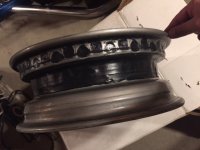D
Deleted member 21150
Guest
Guest
Offline
[h=2]I'm looking to buy new tires for my 100 and want to go with Verdstein Sprint Classic 165 HR 15's. After reading the discerption, the part about not exposing them to temperatures of 20 degrees or lower has me a little worried. I'm sure I won't be driving in 20 degree weather often but do I have to worry about cold weather in general? I usually don't drive once they salt the roads. Below is the description from Coker's site.
Vredstein Sprint Classic | Vredestein Sprint Classic Tires[/h]The Sprint Classic Narrow Tread from Vredestein completes the look of your classic European car. Vredestein Sprint Classic tires feature stylish sidewall markings and classic European tread designs. Don't be fooled, this classic exterior still contains advanced tire technology. The high-quality design ensures that the ‘Sprint’ element in the name is fully justified, with many sizes of the Vredestein Sprint Classic carrying an excellent speed rating. Please note that dimensions listed tread width, section width and overall diameter are non-scientific and based on an inflated tire, mounted on a wheel. Dimensions may vary due to rim width and inflation pressure. Note: Tires exposed to temperatures of 20 degrees F (-7 degrees C) or lower must be permitted to gradually return to temperatures of at least 40 degrees F (5 degrees C) for at least 24 hours before they are flexed in any manner, such as by adjusting inflation pressures, mounting them on wheels, or using them to support, roll or drive a vehicle. Flexing of the specialized rubber compounds used in Grand Touring Summer tires during cold-weather use can result in irreversible compound cracking. While compound cracking is not a warrantable condition because it occurs as the result of improper use or storage, tires exhibiting compound cracking must be replaced.
Vredstein Sprint Classic | Vredestein Sprint Classic Tires[/h]The Sprint Classic Narrow Tread from Vredestein completes the look of your classic European car. Vredestein Sprint Classic tires feature stylish sidewall markings and classic European tread designs. Don't be fooled, this classic exterior still contains advanced tire technology. The high-quality design ensures that the ‘Sprint’ element in the name is fully justified, with many sizes of the Vredestein Sprint Classic carrying an excellent speed rating. Please note that dimensions listed tread width, section width and overall diameter are non-scientific and based on an inflated tire, mounted on a wheel. Dimensions may vary due to rim width and inflation pressure. Note: Tires exposed to temperatures of 20 degrees F (-7 degrees C) or lower must be permitted to gradually return to temperatures of at least 40 degrees F (5 degrees C) for at least 24 hours before they are flexed in any manner, such as by adjusting inflation pressures, mounting them on wheels, or using them to support, roll or drive a vehicle. Flexing of the specialized rubber compounds used in Grand Touring Summer tires during cold-weather use can result in irreversible compound cracking. While compound cracking is not a warrantable condition because it occurs as the result of improper use or storage, tires exhibiting compound cracking must be replaced.

 Hi Guest!
Hi Guest!

 smilie in place of the real @
smilie in place of the real @
 Pretty Please - add it to our Events forum(s) and add to the calendar! >>
Pretty Please - add it to our Events forum(s) and add to the calendar! >> 





